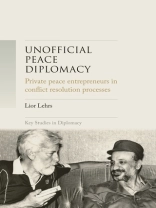This book analyses the international phenomenon of private peace entrepreneurs. These are private citizens with no official authority who initiate channels of communication with official representatives from the other side of a conflict in order to promote a conflict resolution process. It combines theoretical discussion with historical analysis, examining four cases from different conflicts: Norman Cousins and Suzanne Massie in the Cold War, Brendan Duddy in the Northern Ireland conflict and Uri Avnery in the Israeli-Palestinian conflict. The book defines the phenomenon, examines the resources and activities of private peace entrepreneurs and their impact on the official diplomacy, and examines the conditions under which they can play an effective role in peace-making processes.
This book is relevant to United Nations Sustainable Development Goal 16, Peace, justice and strong institutions
Inhoudsopgave
Introduction
1 Theoretical framework: private peace entrepreneurs
2 Norman Cousins and US–Soviet–British negotiations on a Nuclear Test Ban Treaty, 1962–1963
3 Suzanne Massie and the Cold War during the Reagan era, 1983–1988
4 Brendan Duddy and the negotiations between the Provisional IRA and the British government during the conflict in Northern Ireland, 1973–1993
5 Uri Avnery and his dialogue with the PLO in the context of the Israeli–Palestinian conflict, 1975–1985
Conclusions
Appendix
Index
Over de auteur
Lior Lehrs is a Research Fellow at the Leonard Davis Institute for International Relations at the Hebrew University of Jerusalem












